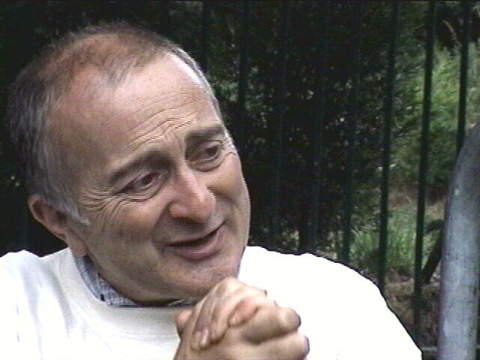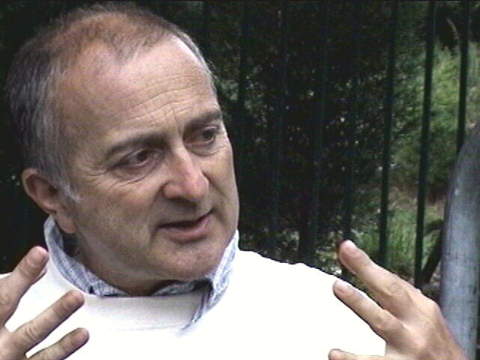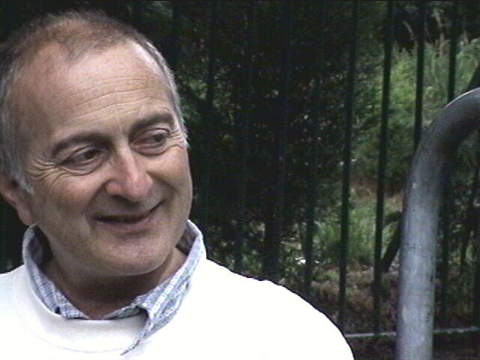|
Tony Robinson and Dirt Bro Bob at the interview--- Note that Tony wore his Dirt Bro T-Shirt! |
|
and a fervent supporter of Archaeology Education.... Visit the Young Archaeologist's Club Official Website!  |
| BOB: What 5 pieces of advice would
you give the aspiring amateur archaeologist? Would you give the same advice
to collectors?
TONY: My five recommendations would be learn stuff, learn even more stuff, learn more, and even more stuff, learn! The thing about archaeology is that it is a science: A new science as it’s only been going on as a science for about 80 years, it’s really in its infancy. There’s so much out there to learn and if you want to be a good amateur archaeologist, then its very important that you approach it scientifically. If you just dig up a hole and grab something, that’s treasure hunting., and because we won’t be able to understand where its come from, whether it came from inside or outside of a house, what period it came from, what other things were associated with it so we know what might have gone on in that room---- if you destroy all of that, well it’s dead. In our lifetime, people’s attitude towards the natural environment has changed completely. You know, when I was a kid, outside London, we stole bird’s eggs, we trashed things, dumped stuff in water because you didn’t know. Now we all know, people still do it, but if they do, at least now they know they are doing something destructive. And every business incorporates into its costs the impact it’s going to have on the environment. But that isn’t true of the historical and archaeological environment. People are still going around plundering and plundering it and it’s even more irreplaceable than the natural environment. Steal a bird’s egg, well, it’s a little tragedy, but those two birds are likely to have more eggs, but pluck something out of the ground and no one can ever replace it: that evidence is gone, it’s killed forever. If you want to be a good amateur archaeologist, if you want to be a responsible one, you need to do it scientifically, and that means learning, learning, learning, and learning and learning.
BOB: How do you deal with imminent construction and development? How do you apply techniques to sites that are here today and gone tomorrow? Because isn’t development the worst enemy of archaeology? TONY: I think that if we put development on one side and archaeology on the other, then we’re saying we’re never going to improve, we’re never going to have nicer houses., we’re always going to find it difficult to go from “a to b” because we can’t dig anything up because we want to preserve everything. The aspiration of the developer and the aspiration of the archaeologist need to go hand-in-hand. Now part of that inevitably will be about legislation. I don’t know anything about the legislation in the States, but in Britain, every developer, when they put in something new has got to have an archaeological check beforehand. More important than that is that developers, builders, and landowners, should understand about the archaeology. That’s what’s going to make the difference because just by building something on top of archaeology doesn’t mean that the archaeology is ruined. If you drive piles into it, fair enough, you’ll ruin it. But, remember earlier when I said that archaeology was a new science, so maybe what that means is that we shouldn’t be digging too much stuff up because we haven’t got the knowledge. So maybe, if we can work out the archaeology under the ground, then laying a car park, or a school, or a hospital on top of it is actually going to protect it. So by the time that school or hospital becomes redundant we’ll know there’s archaeology there and we’ll have the science to explore it much better. I think the example that explains this most dramatically to me is when the English archaeologist Howard Carter first discovered the tomb of Tutankhamun, the very first thing that he did, was to clean everything in it, to sweep it out very very nicely so the photographers could come in—that seemed to him to be a sensible thing to do…We now know, because we’ve got the science, that by doing so he destroyed all those thousands of years of environmental evidence which we’ve now got the science to interpret. So if they’d have left that tomb closed for a hundred years or so we would know that much more about King Tut than we actually know now. This rush to excavate I think is a little bit crazy anyway. You know that sometimes I think development is a good thing, it can actually protect the archaeology so people in the future who’ve got more knowledge than we do now will find out more about it than we ever can.
BOB: The Big Dig was the most revolutionary experiment in interactive archaeology… are you going to plan more of these events? TONY: You’ve got to understand that The Big Dig created the most massive row amongst archaeologists in Britain, some of them were absolutely vitriolic in their attacks on it, even though they didn’t know what we actually doing. I think there’s a really big ideological struggle going on here between some academics who think that they know so much about a subject that they need to hold tight to it and that if the general public gets access to it the general public will destroy it. Now, in part I understand their prudence about that, but if you hold onto something too tight, you crush it, and the problem with archaeology now is that so few ordinary people know very much about it that it’s been trashed all over the place. You’ve got to have confidence with people, I think, and say that if you give people the weapons and the understanding, they’ll likely want to nurture things--- and by weapons, I mean the intellectual weapons, they’ll want to nurture things…And we’ve seen that again with the natural environment--- it’s ordinary people who’ve made the drive toward clean rivers and clean air, not the big companies. The intellectuals have made some very interesting observations but the votes need to be there and at the moment there’s no votes in archaeology so there’s very little money in archaeology and as long as the archaeologists won’t share it with everbody else that will continue to be the case. In Britain something like 40% of all archaeology is under threat from the plow, much more is under threat from metal detectorists who don’t record their finds or record them badly. Some archaeologists are saying that in Britain there will be no metal finds within the first foot of the earth within 20 years because it will have been all detected up…we’re also under threat from lousy legislation, our wreck site legislation for example, is terrible. Our archaeology is also under threat from global warming, as the nature of the coastline changes, the nature of coastal site changes and wreck sites change. So there’s a whole host of things, treasure hunters, museums who’l buy stuff even though with a nod and a wink they don’t know where they come from, who only want what looks attractive. All of this stuff can only be stopped by educating the public. We are passionate in our belief that that’s the right strategy. And boy, like you, are we taking some stick for doing that! So that’s a very long answer to a very simple question. Are we going to do more interactive stuff--- you bet your butt we will! Because that’s what we believe in!
BOB: I’ve got to thank you for that most honest answer! So, we’re going to see the Time Team in the US…. Are you going to host it? TONY: You know I’d love more than anything else to be the host of an American Time Team, but my bet is that, given the American networks that they’ll want an American host. But if I can come over on occasion and be a guest host I’d be happy to do it. |


